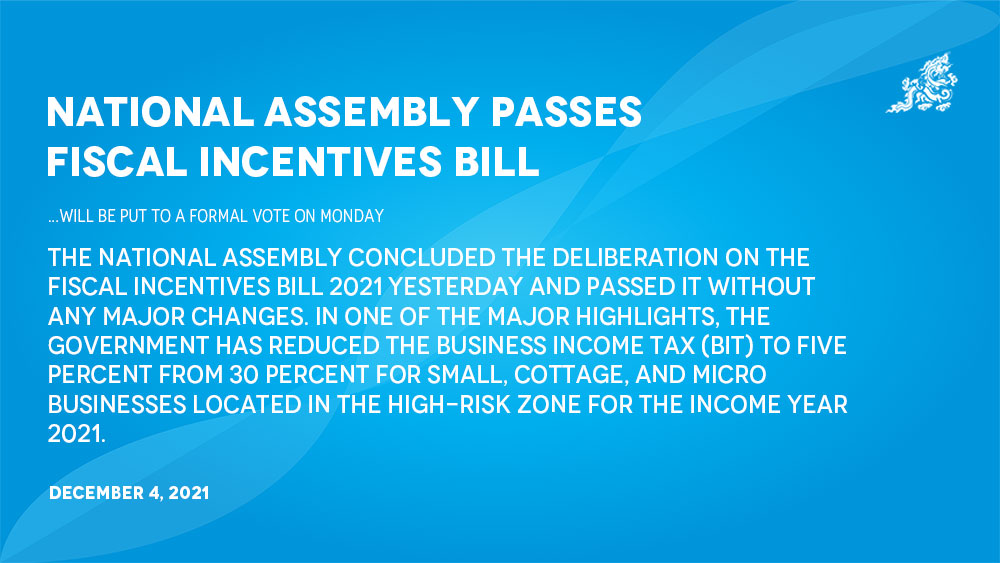…will be put to a formal vote on Monday
MB Subba
The National Assembly concluded the deliberation on the Fiscal Incentives Bill 2021 yesterday and passed it without any major changes.
In one of the major highlights, the government has reduced the Business Income Tax (BIT) to five percent from 30 percent for small, cottage, and micro businesses located in the high-risk zone for the income year 2021.
Phuentshogpelri-Samtse’s Member of Parliament (MP), Ganesh Ghimiray, said that the tax concession was one of the most significant fiscal policies the government has proposed, and that it would immensely benefit the businesses in the high-risk dzongkhags.
Opposition Leader Dorji Wangdi said that the fiscal incentives were expected to provide some relief to businesses and stimulate the economy.
However, he added that the government had not come up with new ideas. “Most of the exemptions are similar to those provided by the former governments.”
He said that the fiscal incentives should be different for establishments located in urban and rural areas.
Finance Minister Namgay Tshering said that the Bill had taken the loopholes in the past Fiscal Incentives Acts into consideration.
Citing an example, he said that with the new Bill, a business that has been receiving direct tax exemptions up to now will not receive the same exemptions as easily and those that did not enjoy the benefit earlier will have a better chance at receiving them. “We have ensured that the tax exemptions are judicious,” he said.
Lyonpo Namgay Tshering also said that the Bills will reduce tax leaks so that the exemptions do not adversely affect revenue.
He said that the payment of taxes should be affordable and that the fiscal incentives will help the economy in the long run. “We have learned from the experiences of the past fiscal incentives.”
Meanwhile, the Bill provides tax exemptions to educational institutions with international accreditation only.
However, members said that such exemptions should be provided to all institutions accredited to the Royal University of Bhutan, and higher secondary schools in the country.
In other exemptions, enterprises that employ one or more additional Bhutanese will be entitled to a 100 percent additional tax deduction on the emoluments paid to the employee for the first three years of the employee’s employment. The ceiling of the deduction on the emolument has been fixed at Nu 35,000 per employee.
According to the finance minister, the measure was aimed at creating job opportunities in the country.
Enterprises carrying out construction projects using locally manufactured construction materials will be entitled to a 30 percent additional tax deduction on the cost incurred with respect to such materials.
The additional deductions granted will be valid until December 31, 2026.
Although members passed the Bill through a show of hands, it will be put to a formal vote on Monday and forwarded to the National Council.
The Bill has been declared a money Bill, where it will depend on the lower house to either accept or reject the upper house’s recommendations.


